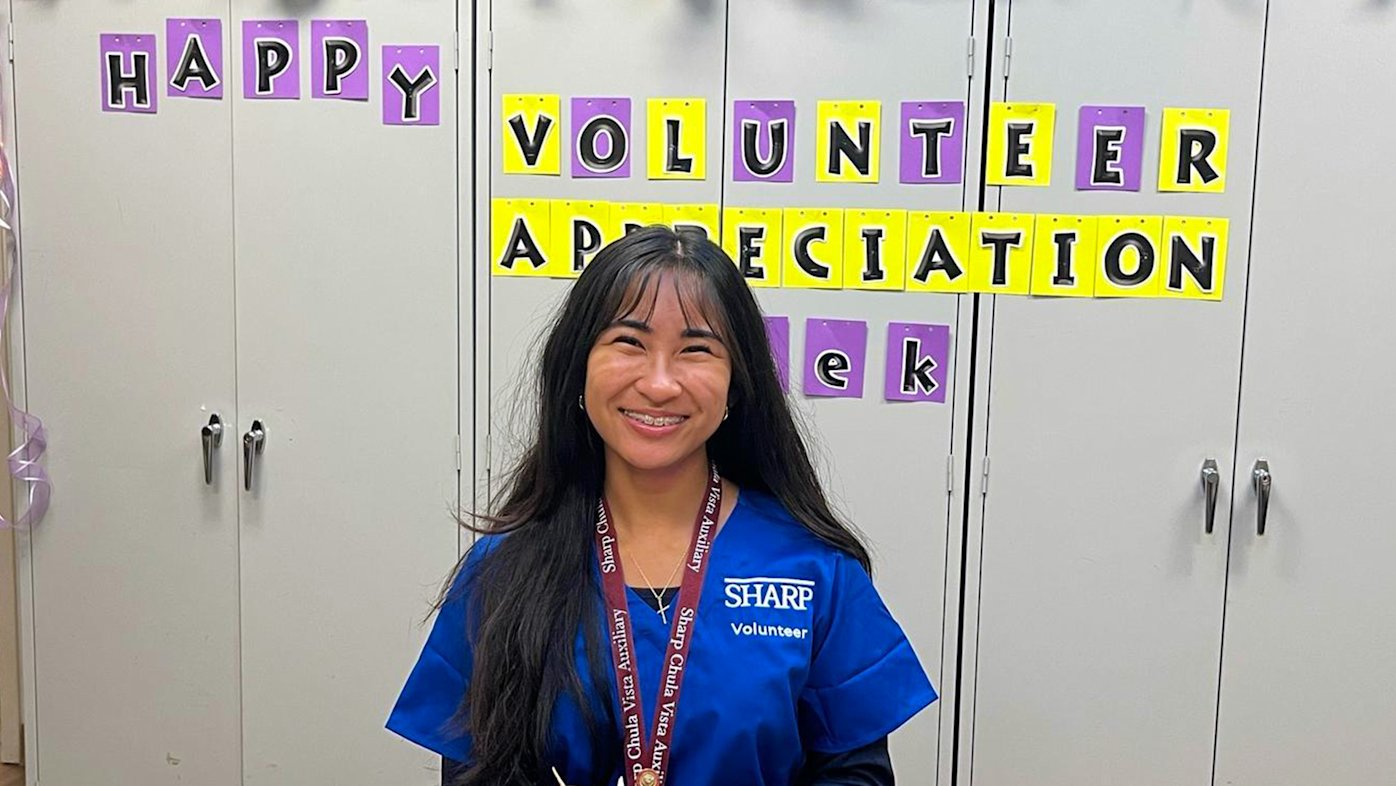
Student volunteer brings joy with wishing cranes
Carefully folded origami cranes carry messages of hope and healing, as one teen volunteer helps brighten patients’ days at Sharp Chula Vista Medical Center.
When Andy York and his wife, Stephanie, met while working at the original Sharp Rees-Stealy Medical Center Downtown in 1998, they could not have anticipated the path they would walk together. That path would take them through love, grief, confusion, acceptance and, ultimately, to a life of advocacy for trans youth and families such as their own.
Andy and Stephanie, both San Diego natives, married in 2001, and in 2002 had a child who was assigned female at birth. After what Andy calls a “normal childhood,” their child began acting out around age 10, becoming sullen and showing signs of clinical depression.
Andy and Stephanie knew something was wrong, and sought help from behavioral health teams at Psychiatric Centers of San Diego (PCSD), Sharp Mesa Vista and Rady Children’s Hospital. Caregivers struggled to determine the root cause of the behavioral and academic problems. Symptoms worsened and self-harm behavior triggered hospitalizations and multiple 72-hour psychiatric holds — nine of them, to be exact — which Andy describes as excruciating for the entire family.
The right question unlocks a door
Finally, a therapist with PCSD asked the right question. Andy and Stephanie sat down with their child who, along with the therapist, shared their story. Their 12-year-old child, assigned female at birth, hated “her”self. Locked inside a female-presenting body was a confused 12-year-old boy, desperate to be recognized.
“It was a shock,” Andy says, looking back at that revelation four years ago. “We’ve always been a fairly liberal family and we knew of stories of trans children, but those families always knew, from the time their child was very young. This was nothing like that,” he says.
In fact, many trans youth develop gender dysphoria at puberty, when sex hormones and the development of secondary sex characteristics trigger or compound the disconnect between brain and body.
Although Andy and Stephanie were shocked and confused, they wanted to learn more. They searched the internet for resources and found Trans Family Support Services, practically in their own backyard. Founder Kathie Moehlig put them in touch with a family support group and a therapist who specializes in working with transgender youth.
Dealing with the “what ifs”
Andy remembers the first parent meeting with the therapist, and the many questions he had for her. “It’s shameful to say now, but I remember thinking, ‘What if it’s a phase?’” he says, a question many parents of trans youth ask. “I left that first meeting kind of upset. I wanted to be able to test this, but there was no test.”
One thing Andy and Stephanie did find out find out was that, regardless of how they felt, the fact was that 58% of all trans teens attempt suicide if they don’t have a family background. Andy recalls, “I asked myself, ‘Do I want a dead daughter or a live son?’”
Although Andy harbored doubts, he and Stephanie immediately recognized the transformation in their child’s behavior. “Just being out and getting help and going to a support group, the self-harm stopped completely,” Andy says. “He has not hurt himself or gotten kicked out of school once since then. He is living his true self.”
Stephanie embraced the transformation and pushed for social and medical interventions. Still, the “what ifs” remained at the back of Andy’s mind. What if it’s temporary? What if he changes his mind?
Letting Matt lead the way
The therapist advised them to follow the instincts of their child, and they allowed him to dress how he wanted and used the name he wanted (Matt), but didn’t consider medical intervention until he was ready.
Matt was ready at age 14, when he began self-harm behavior again after several years. The time was right. Matt began hormone therapy, and Trans Family Support Services helped the family document the medical need and secure approval for gender confirmation surgery and update legal documentation, including the name and gender marker on Matt’s birth certificate.
“The amount of support and help we found during this process helped make our lives so much easier,” Andy says.
Helping other trans families
After nearly five years on this path, Andy and Stephanie found themselves asking fewer — and answering more — questions at family support group meetings. Although Stephanie no longer works for Sharp, her experience as a medical assistant provided a clinical background that she uses as the insurance coordinator and vice president for Trans Family Support Services. She helps families from around the country who have been denied health care services or insurance coverage for a trans child.
The Yorks feel lucky to live in San Diego, where they are surrounded by a supportive community and high-quality medical care. “You will not find a more loving or supporting group than the LGBTQ+ community in San Diego,” Andy says.
Andy is still with Sharp Rees-Stealy more than 20 years later, where he is a manager in Supply Chain Services. He and his family are also patients.
“Sharp Rees-Stealy has been amazing in the way they’ve cared for Matt,” he says. “They changed his name in the record system and haven’t faltered in using it since.” For a trans, transitioning or nonbinary teen, that type of everyday visibility and recognition is incredibly important.
Learn more about Sharp Mesa Vista Hospital’s inpatient and after-school programs for children and teens with emotional and behavioral issues that interfere with daily life.
Sharp Rees-Stealy is proud to offer gender-affirming care.

The Sharp Health News Team are content authors who write and produce stories about Sharp HealthCare and its hospitals, clinics, medical groups and health plan.

Andy York is a supply chain services manager at Sharp Rees-Stealy.
Our weekly email brings you the latest health tips, recipes and stories.